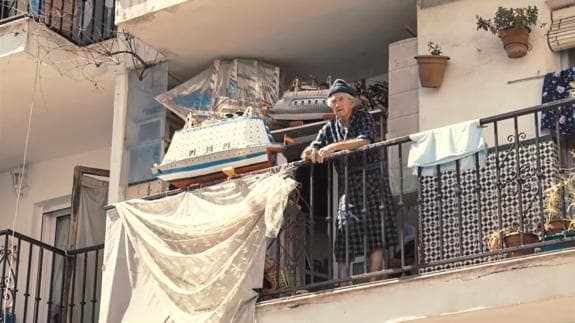Isolation on the balconies of Nerja
Dali Rust's almost prophetical documentary, which takes its name from the famous Balcón de Europa, shows local characters who live in isolation, while at the same time surrounded by people
ALEKK M. SAANDERS
Viernes, 28 de mayo 2021, 13:26
Dali Rust belongs to those creative people who are willing to share what they see and interpret it with the rest of the world. The filmmaker came to the Costa del Sol from Lithuania to discover a new world in the south, full of appreciation for the Andalusian lifestyle and the people's way of thinking.
"I noticed that Andalusian people are almost never alone. It looks like they intentionally surround themselves with people. Perhaps they do it to disguise the fact that an inner loneliness exists. Our norms still dictate that we are basically extroverts dependent upon each other's company - crowds, flocks, festivals etc. and even in the 21st century, we are still scared of not fitting in with society's norms," she explains.
Dali doesn't dislike people. She simply spends more time on her own because it allows her to exercise her imagination. She assumes she prefers to be by herself because this helps to get rid of her social phobias.
"We all have fears: some more, some less. One of the fears is of being alone, or abandoned, or isolated," she said.
Dali once even decided to seek solace in the middle of the forest. "I made a conscious choice to reroute my daily activities. In the forest I didn't need a lot. The lack of television was compensated by enjoying my young children and watching nature. I had plenty of time to re-examine my purpose in life," she says.
That experience helped her to "survive" during the recent lockdowns. "I don't mind confinement because I am self-sufficient," she told SUR in English.
In her films, Dali tries to reveal what is hidden beneath the everyday social norms, the visible façades. However, it was precisely the façades of Nerja that attracted her to settle there and inspired her to start a new documentary.
"All my films are devoted to the social ambience, inner world, isolation and loneliness. One of my significant documentaries was the film Nadiezhda, about the solitude of a woman in need. Another film, Marina's House, is a portrait of a sister of the famous filmmaker Andrey Tarkovsky, who preserves the traditional values of dignity, sincerity, respect and honesty. My last film, The Balcony of Europe is about a few peculiar inhabitants of Nerja," said Dali.
In this Nerja documentary Dali wanted to show two worlds - the visible one and the characters' closed little worlds. One of the people of the film is Eloi, a middle-aged craftsman, who lives in a cave. Two other town-dwellers - a cobbler, Serafín, and an elderly seamstress, Juana - devote most of their time to their favourite, but lonely, work and communicate, generally, only with their pets. Serafín works and sings with his caged birds in his workshop, while Juana has a little helper by her side - a purring cat.
In the Nerja film, Dali has managed to show a different style of living on the Costa del Sol - with self-imposed isolation and 'social distancing' existing even before the pandemic came, making living on balconies routine.
"During the first lockdown the balcony became an improvised shelter for social interaction. Some neighbours played different games, others cheered themselves up by playing musical instruments. My character in the film, 67-year-old Miguel, has always socialised with people via his balcony," Dali said.
Miguel is a creator of illuminated model ships and his works are located on a balcony, clearly visible to people passing by. "For him, his small balcony has always been an arena of self-expression and social interaction," she added.
Dali is hoping to show her film in Nerja but for now it can be seen on You Tube.
